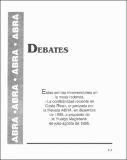| dc.contributor.author | Cedeño Castro, Rogelio | |
| dc.date.accessioned | 2020-11-11T00:03:37Z | |
| dc.date.available | 2020-11-11T00:03:37Z | |
| dc.date.issued | 1995-12 | |
| dc.identifier.issn | 2215-2997 | |
| dc.identifier.other | https://www.revistas.una.ac.cr/index.php/abra/article/view/4367/4197 | |
| dc.identifier.uri | http://hdl.handle.net/11056/18622 | |
| dc.description.abstract | La huelga que realizaron los trabajadores de la educación de Costa Rica, durante los meses de julio y agosto de 1995, con una duración de cinco semanas, no puede ser percibida simplemente como una más de las que, con alguna frecuencia, ha venido realizando el magisterio costarricense, desde hace poco más de una década , pues esto sería reducir enormemente las posibilidades que su interpretación ofrece, en términos de sus enseñanzas
para el movimiento de los trabajadores y para los estudiosos de la realidad social contemporánea, además de que se estaría cayendo así, en la más grosera de las simplificaciones acerca de un evento que, por sus alcances y su naturaleza esencialmente diferente, marca un hito en la historia social del país, ya que permite ubicar la finalización de un prolongado período de tregua en la lucha
social que se había extendido, por más de medio siglo, a partir de la época en que se dictó el Código de Trabajo y se produjo la reforma social de los años cuarenta e indica, en consecuencia, el inicio de un nuevo período de conflictos sociales que, al contrario de lo que parecen pensar muchos comentaristas ligados con los
intereses de los sectores dominantes, apenas ha mostrado algunas de las características que habrá de tener, en los próximos años, en que dará lugar a muy diversas y puntuales manifestaciones. | es_ES |
| dc.description.abstract | The five-week strike by Costa Rican education workers in July and August 1995 cannot be seen simply as one more of the many strikes that have been carried out by the Costa Rican teachers for a little more than a decade, as this would greatly reduce the number of teachers who are on strike. the possibilities that their interpretation offers, in terms of their teachings
for the workers' movement and for scholars of social reality contemporary, besides that it would be falling thus, in the coarsest of simplifications about an event that, because of its scope and nature essentially different, marks a milestone in the country's social history, as allows to locate the end of a long period of truce in the fight
social that had extended, for more than half a century, from the time the Labour Code was issued and the social reform of the 1940s took place and thus indicates the beginning of a new period of social conflict which, contrary to what many commentators linked to the
interests of the dominant sectors, has shown only some of the characteristics that it will have, in the next years, in which it will give rise to very diverse and punctual manifestations. | es_ES |
| dc.description.sponsorship | Universidad Nacional, Costa Rica | es_ES |
| dc.language.iso | spa | es_ES |
| dc.publisher | Editorial de la Universidad Nacional | es_ES |
| dc.rights | Acceso abierto | es_ES |
| dc.rights.uri | http://creativecommons.org/licenses/by-nc-sa/4.0/ | * |
| dc.source | Revista ABRA Vol. 16, No. 21-22, p. 113-139 | es_ES |
| dc.subject | EDUCACIÓN | es_ES |
| dc.subject | EDUCATION | es_ES |
| dc.subject | HUELGAS | es_ES |
| dc.subject | MARGINALIDAD | es_ES |
| dc.subject | SINDICATOS | es_ES |
| dc.subject | COSTA RICA | es_ES |
| dc.subject | SINDICATO DE TRABAJADORES DE LA EDUCACIÓN COSTARRICENSE | es_ES |
| dc.subject | MARGINALITY | es_ES |
| dc.subject | STRIKES | es_ES |
| dc.subject | UNIONS | es_ES |
| dc.title | La huelga magisterial de julio-agosto de 1995: los trabajadores en lucha contra la exclusión y el hambre | es_ES |
| dc.title.alternative | The teachers' strike of July-August 1995: workers fighting against exclusion and hunger | es_ES |
| dc.type | http://purl.org/coar/resource_type/c_6501 | es_ES |
| dc.description.procedence | Escuela de Sociología | es_ES |


